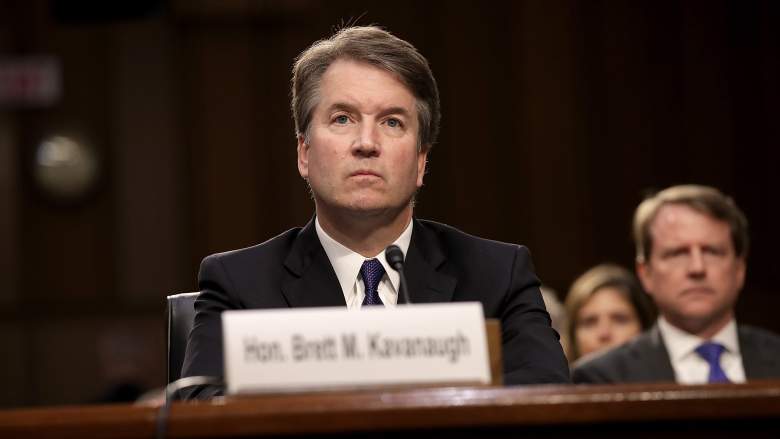
Getty Judge Brett Kavanaugh.
While Christina Blasey Ford has taken a polygraph test, the man she is accusing of sexual assault, Supreme Court nominee Judge Brett Kavanaugh, has not, despite calls from some that he also take the examination. Ford has been questioned about the results of the test she took in August during a hearing Thursday before the Senate Judiciary Committee. She has also been asked about who paid for the exam (her lawyers say they paid for it, as is common practice). Meanwhile, some Democrats and activists have said that Kavanaugh should match what his accuser did and take a polygraph exam as part of the investigation.
“Kavanaugh should take a polygraph. Don’t reply they’re not admissible. I watch TV too. The US Government administers thousands a year to people seeking sensitive jobs. Why? Bc they have value. How? Strapping in scares the bejeezus out of you. An innocent man would take one. ASAP,” former Clinton aide Philippe Reines tweeted. Philip Gourevitch, a writer at The New Yorker, tweeted, “A moment to remember: (Christine Blasey Ford’s) pure & perfect candor about being purely & perfectly candid, willing to submit to this dubious procedure with emotions & exhaustion of grandmother’s funeral coursing through her. What reason can Kavanaugh give if asked why he doesn’t take a polygraph?”
Representative Cheri Bustos, a Democratic congresswoman from Illinois, tweeted, “The Washington Republicans’ prosecutor is grasping at straws. Dr. Ford took a polygraph & passed because she was TELLING THE TRUTH! Perhaps Judge #Kavanaugh would like to take one too? Better idea, how about letting the FBI do an investigation into all of this?” Democratic analyst Paul Begala added, “The woman who says Kavanaugh attacked her has reportedly passed a polygraph test. Will Kavanaugh take one?”
Kavanaugh has not been asked whether he would or would not take the test, but Republicans supporting his nomination to the Supreme Court have resisted further investigation into the accusations against him, including by the FBI. Kavanaugh has been questioned about the accusations by aides for Republicans on the Senate Judiciary Committee and will testify publicly about the allegations Thursday afternoon following the conclusion of Ford’s testimony.
Ford took the polygraph exam with a former FBI agent, Jeremiah Hanafin, on August 7, 2018, in Maryland, at a hotel following the funeral of her grandmother. Hanafin wrote in his report, he found, “No Deception Indicated– Probability of Deception is Less than .02 Percent.”
Kavanaugh Wrote in a 2016 Ruling That ‘Law Enforcement Agencies Use Polygraphs to Test the Credibility of Witnesses
Polygraph exams, also known as lie detector tests, are controversial and often not admissible in trials. Aaron Keller wrote for Law & Crime, “lie detector test results are largely considered inadmissible in court because the tests are not reliable. People can cheat them and, sometimes, the tests pick up false readings.” In U.S. v. Scheffer (1998), the U.S. Supreme Court said, “[T]here is simply no consensus that polygraph evidence is reliable. To this day, the scientific community remains extremely polarized about the reliability of polygraph techniques.” Attorney Mark Zaid tweeted, “Kudos to her in coming forward but I wish she, and the media, would stop touting #polygraph in a way that signifies that means anything. It doesn’t. Does anyone really believe that had she ‘failed’ (and that signifies nothing too), we would have known.”
But as Minnesota Senator Amy Klobuchar, a Democrat, points out, Kavanaugh has ruled on cases involving polygraphs in the past. In a 2016 case on the D.C. Circuit Court of Appeals, Kavanaugh wrote, “law enforcement agencies use polygraphs to test the credibility of witnesses’ & the tests ‘serve law enforcement purposes.'” In that case, Sack vs. United States Department of Defense, Kavanaugh ruled polygraphs could be accepted by employers as credible during the hiring process.
Joe Patrice, the editor of Above the Law, wrote on Twitter, “The opinion is about getting reduced rates for FOIA requests — but the point is that despite possible reasons to question polygraphs he explains that ‘The Government has satisfactorily explained how polygraph examinations serve law enforcement purposes. Those agencies also use polygraphs to “screen applicants for security clearances so that they may be deemed suitable for work in critical law enforcement, defense, and intelligence collection roles.’ The point is, polygraphs are absolutely NOT ironclad evidence and drift toward psuedoscience. But it’s telling that a guy can defend them in one breath and refuse to submit to one in the other.”
READ NEXT: Christine Blasey Ford Timeline: From High School to Historic Testimony